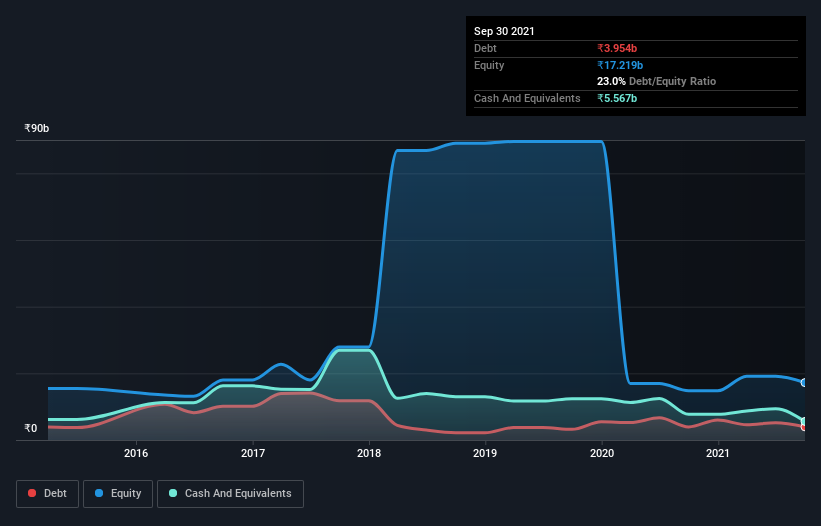
David Iben put it well when he said, 'Volatility is not a risk we care about. What we care about is avoiding the permanent loss of capital.' So it might be obvious that you need to consider debt, when you think about how risky any given stock is, because too much debt can sink a company. As with many other companies Thomas Cook (India) Limited (NSE:THOMASCOOK) makes use of debt. But should shareholders be worried about its use of debt?
Why Does Debt Bring Risk?
Debt assists a business until the business has trouble paying it off, either with new capital or with free cash flow. Part and parcel of capitalism is the process of 'creative destruction' where failed businesses are mercilessly liquidated by their bankers. However, a more frequent (but still costly) occurrence is where a company must issue shares at bargain-basement prices, permanently diluting shareholders, just to shore up its balance sheet. Having said that, the most common situation is where a company manages its debt reasonably well - and to its own advantage. When we examine debt levels, we first consider both cash and debt levels, together.
See our latest analysis for Thomas Cook (India)
What Is Thomas Cook (India)'s Net Debt?
The chart below, which you can click on for greater detail, shows that Thomas Cook (India) had ₹3.95b in debt in September 2021; about the same as the year before. However, it does have ₹5.57b in cash offsetting this, leading to net cash of ₹1.61b.

How Healthy Is Thomas Cook (India)'s Balance Sheet?
According to the last reported balance sheet, Thomas Cook (India) had liabilities of ₹17.1b due within 12 months, and liabilities of ₹10.4b due beyond 12 months. Offsetting this, it had ₹5.57b in cash and ₹881.7m in receivables that were due within 12 months. So it has liabilities totalling ₹21.1b more than its cash and near-term receivables, combined.
This deficit is considerable relative to its market capitalization of ₹24.4b, so it does suggest shareholders should keep an eye on Thomas Cook (India)'s use of debt. This suggests shareholders would be heavily diluted if the company needed to shore up its balance sheet in a hurry. While it does have liabilities worth noting, Thomas Cook (India) also has more cash than debt, so we're pretty confident it can manage its debt safely. There's no doubt that we learn most about debt from the balance sheet. But it is Thomas Cook (India)'s earnings that will influence how the balance sheet holds up in the future. So if you're keen to discover more about its earnings, it might be worth checking out this graph of its long term earnings trend.
In the last year Thomas Cook (India) had a loss before interest and tax, and actually shrunk its revenue by 61%, to ₹12b. That makes us nervous, to say the least.
So How Risky Is Thomas Cook (India)?
By their very nature companies that are losing money are more risky than those with a long history of profitability. And we do note that Thomas Cook (India) had an earnings before interest and tax (EBIT) loss, over the last year. Indeed, in that time it burnt through ₹3.8b of cash and made a loss of ₹2.3b. Given it only has net cash of ₹1.61b, the company may need to raise more capital if it doesn't reach break-even soon. Summing up, we're a little skeptical of this one, as it seems fairly risky in the absence of free cashflow. There's no doubt that we learn most about debt from the balance sheet. But ultimately, every company can contain risks that exist outside of the balance sheet. For example Thomas Cook (India) has 2 warning signs (and 1 which is potentially serious) we think you should know about.
When all is said and done, sometimes its easier to focus on companies that don't even need debt. Readers can access a list of growth stocks with zero net debt 100% free, right now.
If you're looking to trade Thomas Cook (India), open an account with the lowest-cost platform trusted by professionals, Interactive Brokers.
With clients in over 200 countries and territories, and access to 160 markets, IBKR lets you trade stocks, options, futures, forex, bonds and funds from a single integrated account.
Enjoy no hidden fees, no account minimums, and FX conversion rates as low as 0.03%, far better than what most brokers offer.
Sponsored ContentValuation is complex, but we're here to simplify it.
Discover if Thomas Cook (India) might be undervalued or overvalued with our detailed analysis, featuring fair value estimates, potential risks, dividends, insider trades, and its financial condition.
Access Free AnalysisThis article by Simply Wall St is general in nature. We provide commentary based on historical data and analyst forecasts only using an unbiased methodology and our articles are not intended to be financial advice. It does not constitute a recommendation to buy or sell any stock, and does not take account of your objectives, or your financial situation. We aim to bring you long-term focused analysis driven by fundamental data. Note that our analysis may not factor in the latest price-sensitive company announcements or qualitative material. Simply Wall St has no position in any stocks mentioned.
Have feedback on this article? Concerned about the content? Get in touch with us directly. Alternatively, email editorial-team (at) simplywallst.com.
About NSEI:THOMASCOOK
Thomas Cook (India)
Offers integrated travel services in India and internationally.
Undervalued with reasonable growth potential.


